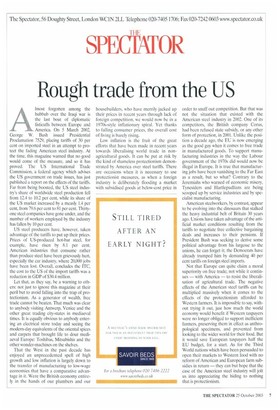Rough trade from the US
A[most forgotten among the hubbub over the Iraqi war is the last bout of diplomatic fisticuffs between Europe and America, On 5 March 2002, George W. Bush issued Presidential Proclamation 7529, placing tariffs of 30 per cent on imported steel in an attempt to protect the fading American steel industry. At the time, this magazine warned that no good would come of the measure, and so it has proved. The US International Trade Commission, a federal agency which advises the US government on trade issues, has just published a report on the effects of the tariffs. Far from being boosted, the US steel industry's share of worldwide steel production fell from 12.4 to 10.2 per cent, while its share of the US market increased by a measly 1.4 per cent, from 79.6 per cent to 81 per cent. Thirtyone steel companies have gone under, and the number of workers employed by the industry has fallen by 10 per cent.
US steel producers have, however, taken advantage of the tariffs to put up their prices. Prices of US-produced hot-bar steel, for example, have risen by 8.1 per cent. American industries that consume rather than produce steel have been grievously hurt, especially the car industry, where 20,000 jobs have been lost. Overall, concludes the ITC, the cost to the US of the import tariffs was a reduction in GDP of $30.4 million.
Let that, as they say, be a warning to others: not just to ignore this magazine at their peril but to avoid falling into the trap of protectionism. As a generator of wealth, free trade cannot be beaten. That much was clear to anybody visiting Antwerp, Venice and the other great trading city-states in mediaeval times. It is equally obvious to anybody entering an electrical store today and seeing the modern-day equivalents of the oriental spices and carpets that brought life to dour mediaeval Europe: Toshibas, Mitsubishis and the other wonder-machines on the shelves.
That the West in the past decade has enjoyed an unprecedented spell of high growth and low inflation is largely down to the transfer of manufacturing to low-wage economies that have a comparative advantage in it. Were the British economy entirely in the hands of our plumbers and our housebuilders, who have merrily jacked up their prices in recent years through lack of foreign competition, we would now be in a 1970s-style inflationary spiral. Yet thanks to falling consumer prices, the overall cost of living is barely rising.
Low inflation is the fruit of the great efforts that have been made in recent years towards liberalising world trade in nonagricultural goods. It can be put at risk by the kind of shameless protectionism demonstrated by America over steel tariffs. There are occasions when it is necessary to use protectionist measures, as when a foreign industry is deliberately flooding a market with subsidised goods at below-cost price in
order to snuff out competition. But that was not the situation that existed with the American steel industry in 2002. One of its competitors, the British company Corus, had been refused state subsidy, or any other form of protection, in 2001. Unlike the position a decade ago, the EU is now emerging as the good guy when it comes to free trade in manufactured goods. To support manufacturing industries in the way the Labour government of the 19708 did would now be illegal in Europe. It is true that manufacturing jobs have been vanishing to the Far East as a result, but so what? Contrary to the Jeremiahs who warned of economic misery, Tynesiders and Hartleptidlians are being scooped up by service industries and by specialist manufacturing.
American steelworkers, by contrast, appear to he evolving into the dinosaurs that stalked the heavy industrial belt of Britain 30 years ago. Unions have taken advantage of the artificial market conditions resulting from the tariffs to negotiate free collective bargaining deals and increases to their pensions. If President Bush was seeking to derive some political advantage from his largesse to the unions, he can forget it; the Democrats have already trumped him by demanding 40 per cent tariffs on foreign steel imports.
Not that Europe can quite claim a moral superiority on free trade; not while it continues — with America — to resist the liberalisation of agricultural trade. The negative effects of the American steel tariffs can be multiplied massively when it comes to the effects of the protectionism afforded to Western farmers. It is impossible to say, without trying it out, just how much the world economy would benefit if Western taxpayers were no longer obliged to support inefficient farmers, preserving them in effect as anthropological specimens, and prevented from looking to the wider world for their food. But it would save European taxpayers half the EU budget, for a start. As for the Third World nations which have been persuaded to open their markets to Western food with no reform of American and European farm subsidies in return — they can but hope that the case of the American steel industry will jolt us into appreciating the hiding to nothing that is protectionism.


































































































 Previous page
Previous page